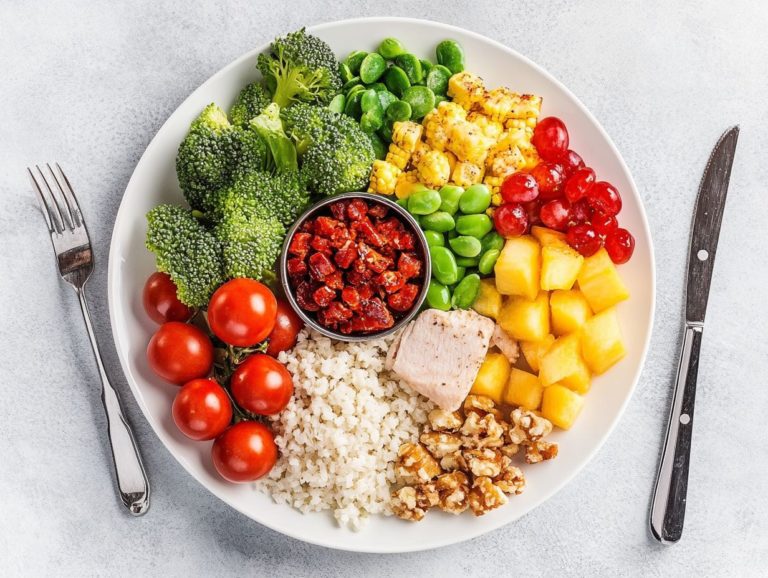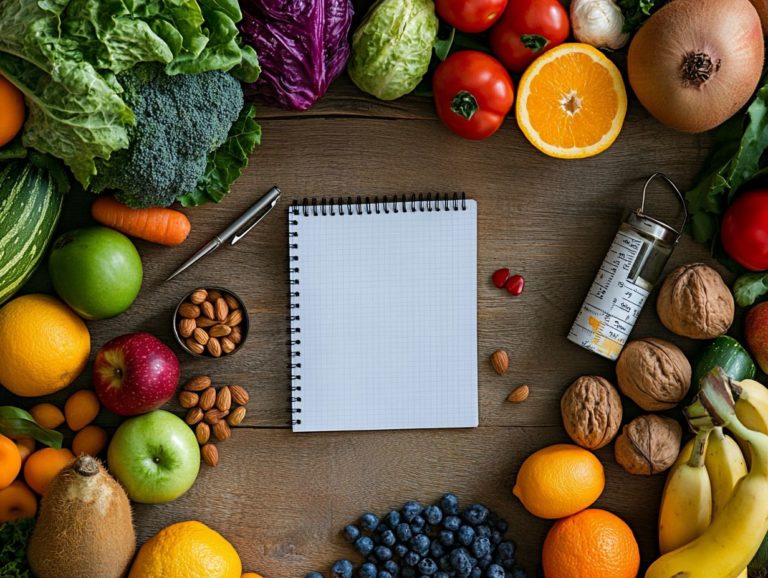5 Things to Know About Dietary Guidelines for Athletes
Nutrition serves as the backbone of athletic performance. Yet, many athletes often underestimate its pivotal role in their training and competition.
This article delves into essential dietary guidelines tailored specifically for athletes. You ll gain insights into the three main types of nutrients your body needs: carbohydrates, proteins, and fats, the significance of hydration, and maintaining electrolyte balance.
It also provides practical tips for pre- and post-workout nutrition. Additionally, it offers strategies for meal planning on the go and highlights common dietary pitfalls to steer clear of.
Whether you re a seasoned competitor or just embarking on your athletic journey, this guide will supercharge your performance!
Contents
- Key Takeaways:
- 1. Importance of Proper Nutrition for Athletes
- 2. Understanding the Dietary Guidelines for Athletes
- 3. Macronutrient Needs for Athletes
- 4. Hydration and Electrolyte Balance for Athletes
- 5. Pre- and Post-Workout Nutrition Recommendations
- How Can Athletes Tailor Their Diets to Meet Their Specific Needs?
- What Are Some Common Nutrition Mistakes Made by Athletes?
- What Are the Benefits of Following Dietary Guidelines for Athletes?
- How Can Athletes Incorporate Supplements into Their Diets Safely?
- What Are Some Tips for Meal Planning for Athletes?
- How Can Athletes Maintain a Balanced Diet While Traveling for Competitions?
- Frequently Asked Questions
Key Takeaways:
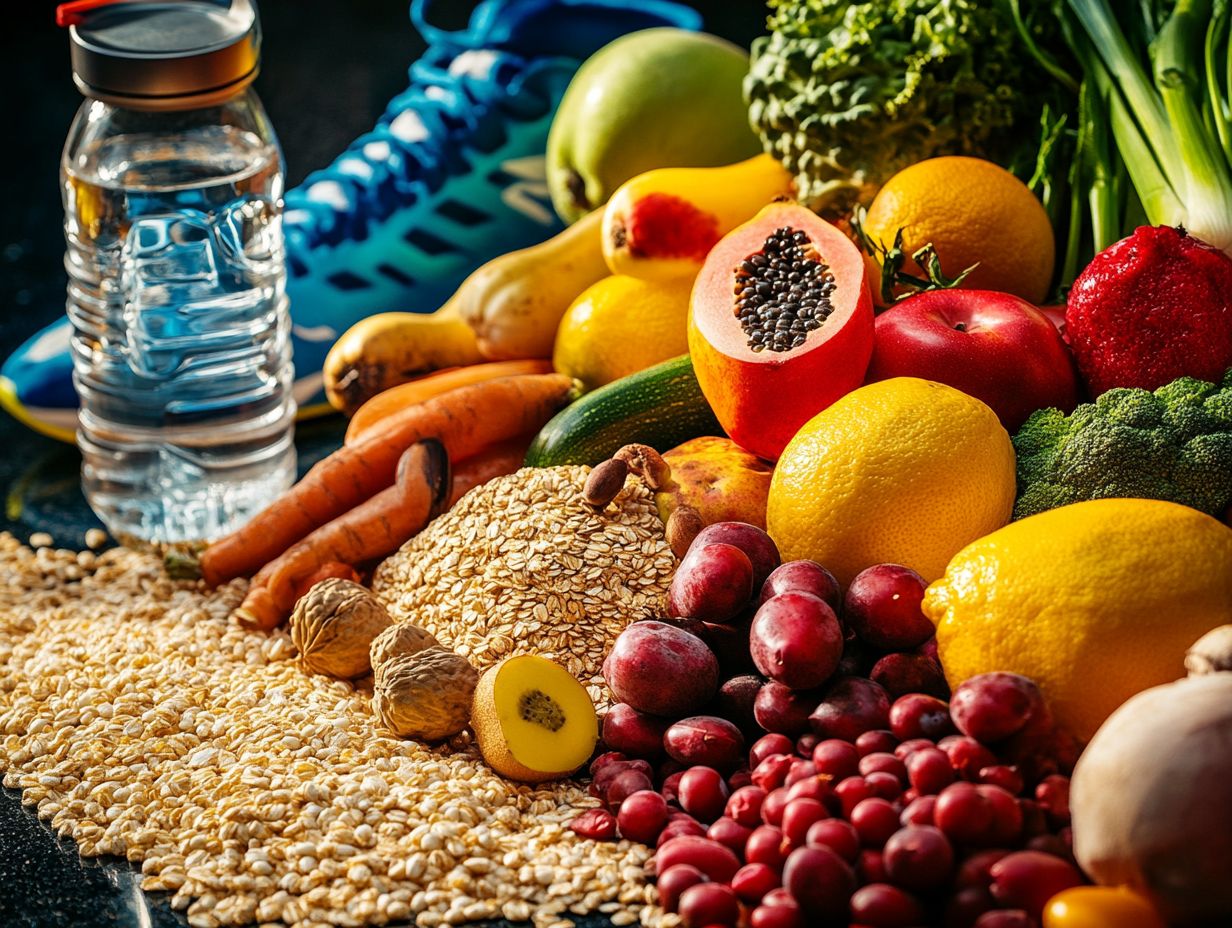
- Athletes should prioritize proper nutrition to optimize performance and recovery.
- The dietary guidelines for athletes emphasize the needs for carbohydrates, proteins, and fats, hydration, and pre- and post-workout nutrition.
- Tailoring diets, following guidelines, safe supplement use, and meal planning are key for athlete nutrition.
1. Importance of Proper Nutrition for Athletes
Proper nutrition is vital for you as an athlete. It directly influences your physical health, energy levels, and overall exercise performance.
Carbohydrates are your primary fuel source. They provide the energy you need for high-intensity activities and endurance training.
Proteins are equally important; they aid in muscle repair and growth. This helps you recover from strenuous workouts and build strength.
Healthy fats are essential for hormone production. They also serve as long-term energy reserves.
A balanced diet not only supports these critical functions but also helps you maintain energy balance. Energy balance means consuming as many calories as you burn.
Without the right mix of nutrients, you risk fatigue and impaired recovery. These issues could jeopardize your performance and overall well-being.
2. Understanding the Dietary Guidelines for Athletes
Understanding dietary guidelines is essential for you as an athlete aiming to optimize your nutrition plan. These guidelines help you select the right foods and manage your energy intake.
By following these guidelines, you can gain insight into your specific calorie needs based on your activity levels and goals. This helps you maintain energy balance and ward off fatigue.
Emphasizing food variety is equally important. It ensures you receive a comprehensive range of vitamins and minerals that support your overall performance and recovery.
Applying these guidelines makes navigating personal food preferences simpler. You can enjoy your favorite foods while still meeting your nutritional requirements.
This thoughtful approach allows you to fuel your body effectively and savor your meals. It fosters a healthier relationship with food that benefits both your performance and well-being.
3. Macronutrient Needs for Athletes
You have specific macronutrient needs that fluctuate based on your athletic pursuits. To excel, focus on carbohydrates for energy, proteins for muscle recovery, and healthy fats to bolster your overall health.
Prioritizing these nutrients is essential. Adjust your intake according to the intensity and duration of your workouts.
Carbohydrates from whole grains, fruits, and vegetables deliver the quick energy required for high-intensity training. Proteins from lean meats, dairy, and legumes are critical for repairing and rebuilding muscle tissues after exercise.
Healthy fats from nuts, seeds, and avocados provide sustained energy and support hormonal balance. Both are crucial for optimal performance.
By mindfully incorporating these macronutrients into your diet, you can enhance your athletic performance. Elevate your recovery strategies to achieve even better results.
Start fueling your body right today and watch your performance soar!
4. Hydration and Electrolyte Balance for Athletes
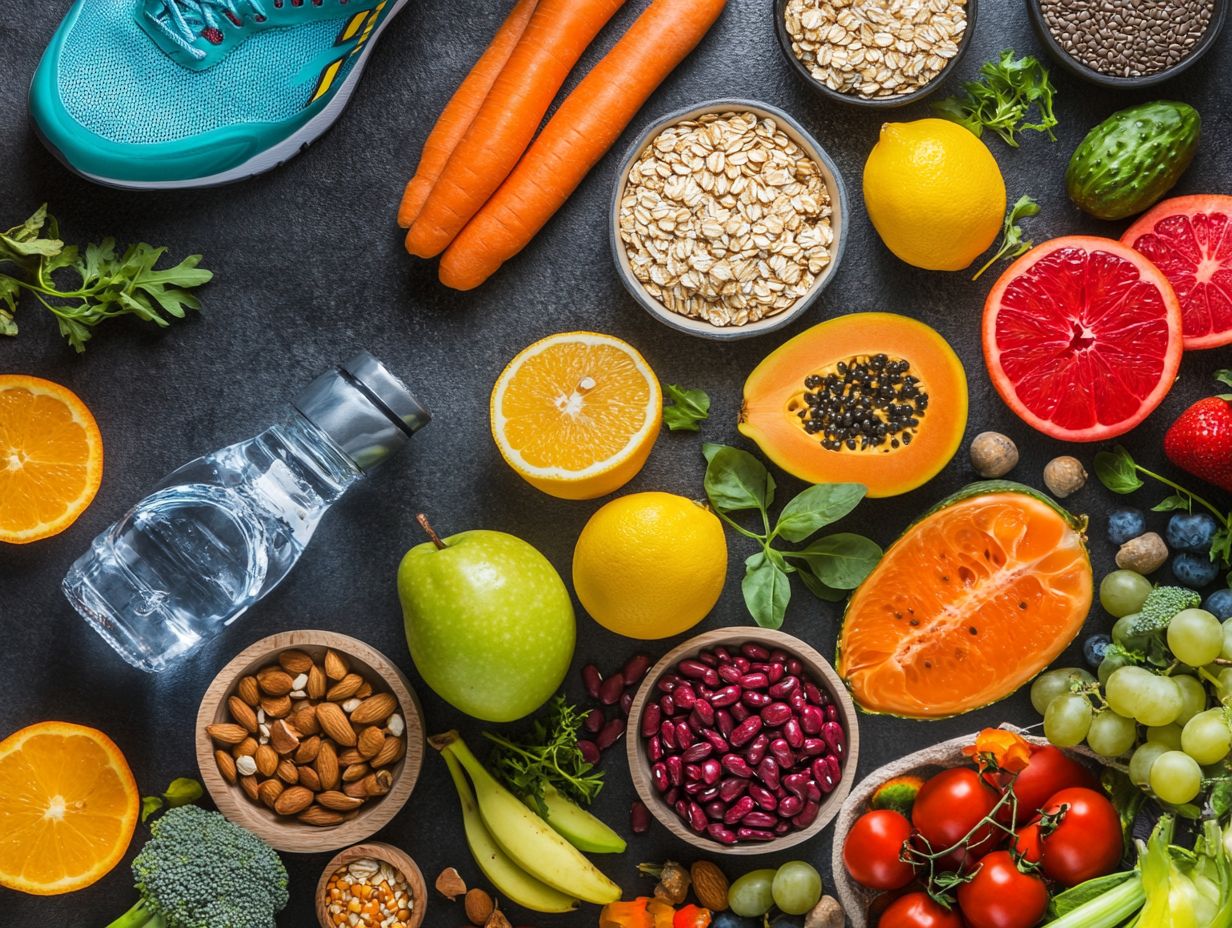
Maintaining proper hydration and electrolyte balance is crucial for you as an athlete. Inadequate fluid intake can lead to significant health risks, including decreased performance and increased fatigue.
On the flip side, employing effective hydration strategies can enhance your exercise adaptation and overall physical health. Understanding your hydration levels is vital for performance, especially during training sessions and competitions.
When you engage in intense physical activity, your body loses water and electrolytes through sweat. This loss can hinder your performance, leading to cramping, heat exhaustion, or even more severe issues like heat stroke.
To combat these risks, incorporate sports drinks and natural electrolyte sources into your routine. They help replenish lost fluids and maintain necessary electrolyte balance.
You can assess your hydration needs through simple techniques, such as monitoring urine color and tracking fluid intake before, during, and after exercise. By taking these steps, you can make informed decisions that support your performance and health.
5. Pre- and Post-Workout Nutrition Recommendations
Strategically planning your pre- and post-workout nutrition is essential for elevating your athletic performance. The right mix of energy intake, hydration, and when to eat nutrients enhances your exercise capabilities and supports muscle recovery.
To set the stage for optimal performance, aim to consume a balanced meal about 2-3 hours before you exercise. A blend of complex carbohydrates think whole grains and fruits paired with lean protein sources like chicken or tofu is ideal. Don’t forget to add some healthy fats from avocados or nuts; they provide that sustained energy you need.
After your workout, it’s important to replenish your body with a meal or snack rich in protein and carbohydrates within 30 to 60 minutes. Options like a protein shake or a turkey sandwich work wonders.
Staying well-hydrated by drinking water or electrolyte solutions before, during, and after your sessions is crucial. This approach helps maintain your performance levels and accelerates recovery, ensuring you come back stronger every time.
How Can Athletes Tailor Their Diets to Meet Their Specific Needs?
You can tailor your diet to meet specific needs by considering your sport type, training regimen, and personal dietary preferences. This way, your nutritional plan supports performance enhancement and aligns with your individual health goals.
For example, if you re a distance runner, you might require a higher carbohydrate intake to power through long training sessions. Meanwhile, if you re into weightlifting, increasing your protein intake could be beneficial for muscle recovery and growth.
It s essential to indulge in foods you enjoy, whether that s adding your favorite fruits into smoothies or giving a healthy twist to traditional comfort foods. By harmonizing your personal preferences with your nutritional requirements, you can create a sustainable eating plan that boosts your performance without leaving you feeling deprived.
What Are Some Common Nutrition Mistakes Made by Athletes?
Many athletes unknowingly fall into common nutrition traps that can significantly hinder their performance enhancement efforts. This includes overlooking proper hydration, neglecting dietary guidelines, or relying too much on nutritional supplements without a robust foundation of healthy eating habits.
Such oversights can manifest in ways like skipping meals, leading to insufficient energy intake, or consuming food at inconvenient times that clash with their training schedule. To tackle these challenges head-on, it’s crucial for athletes like you to establish a consistent meal routine filled with balanced, nutrient-dense foods.
Keeping a food diary can be a game-changer, helping you track your eating patterns and shed light on any detrimental habits. Adopting a mindset of mindful eating rather than viewing nutrition as just another task on your to-do list plays a pivotal role in optimizing your performance and enhancing overall health.
Start today by reviewing your diet and making small changes that can lead to big improvements!
What Are the Benefits of Following Dietary Guidelines for Athletes?
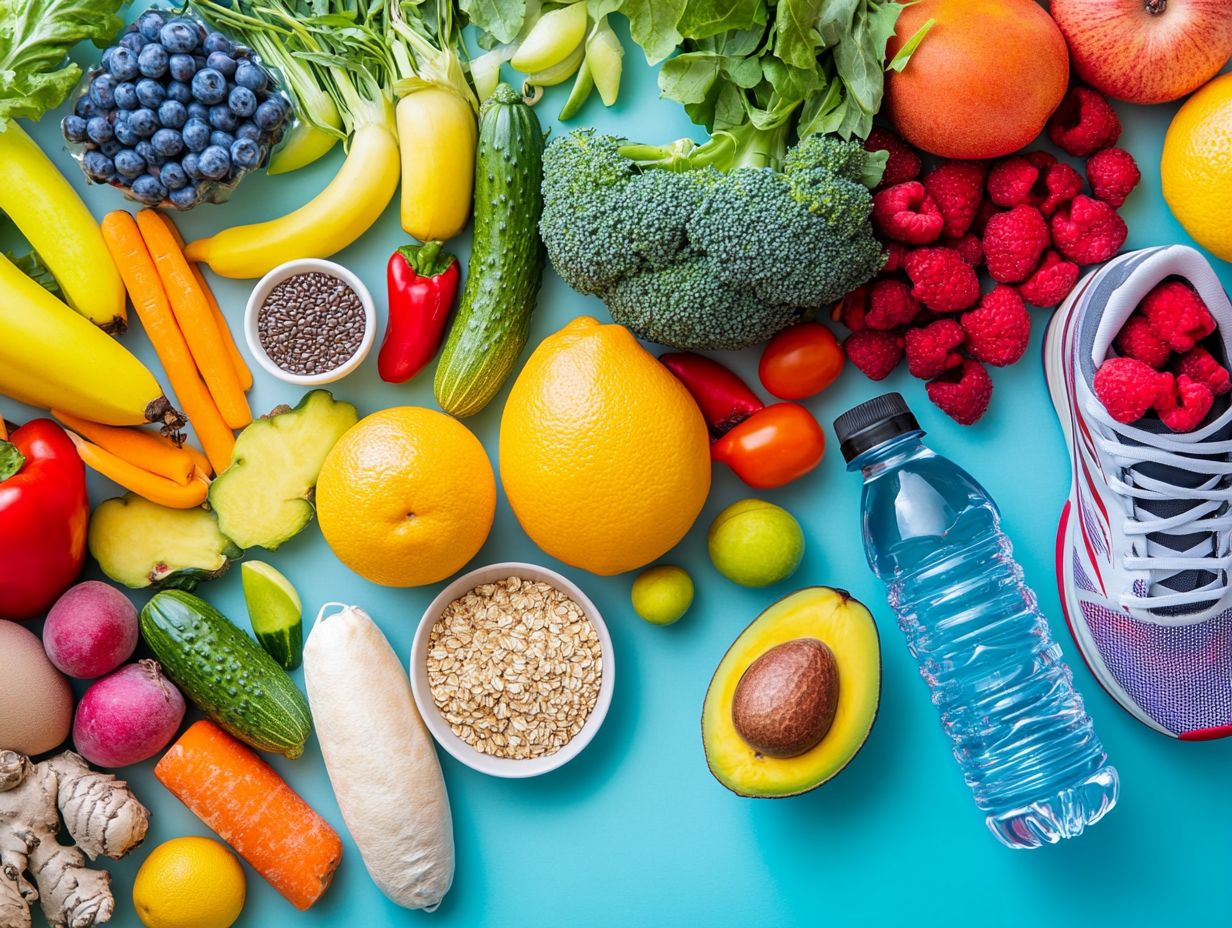
Following dietary guidelines presents numerous benefits for you as an athlete. These include improved energy balance, enhanced performance, and reduced health risks. This approach lays a solid foundation for long-term physical health and success in your sport.
By incorporating healthy foods into your meals, you significantly boost your endurance during training sessions. This enables longer and more effective workouts. Research shows that a well-balanced intake of carbohydrates enhances glycogen storage, which directly influences your stamina and recovery times.
Effective hydration strategies maintain muscle function and sharpen your mental clarity and focus during competitions.
When you prioritize nutrition based on established dietary guidelines, you elevate your performance levels while contributing to a sustainable, healthier lifestyle that supports both your athletic pursuits and personal well-being.
How Can Athletes Incorporate Supplements into Their Diets Safely?
Incorporating nutritional supplements into your diet as an athlete can be beneficial, but it requires careful consideration of your dietary needs and potential health risks. The goal is to ensure that these supplements complement a balanced diet rather than replace natural foods.
With many options available, from protein powders to vitamins, it s essential to discern which products genuinely enhance your performance and recovery. Protein powders can aid in muscle repair and growth, while vitamins and minerals play a crucial role in maintaining overall health and preventing deficiencies.
Choosing high-quality supplements involves evaluating ingredient lists, researching brands, and looking for third-party testing certifications. It s wise to consult with medical practitioners or registered dietitians before starting any supplementation regimen. They can provide personalized recommendations and ensure your dietary strategy aligns with your unique goals and health status.
What Are Some Tips for Meal Planning for Athletes?
Effective meal planning is crucial as you strive to optimize your nutrition. It allows you to meet your energy needs while maintaining food variety and sticking to healthy eating habits throughout your training regimen.
By organizing your meals in advance, you gain better control over your dietary intake. This enables you to make informed choices that enhance your performance. Start by creating a balanced meal schedule tailored to your specific training cycles. Be sure to include a mix of proteins, healthy fats, and carbohydrates in every meal.
The importance of food preparation cannot be overstated. Pre-cooking and portioning your meals can save time and help you resist unhealthy options.
To keep your meals exciting, incorporate a diverse range of ingredients and flavors throughout the week. This not only satisfies your taste buds but ensures you effectively meet your nutritional goals.
How Can Athletes Maintain a Balanced Diet While Traveling for Competitions?
Maintaining a balanced diet while traveling for competitions can be challenging. However, with strategic planning and mindful food choices, you can uphold healthy eating habits and ensure optimal performance on the road.
Start by researching restaurant menus in advance. Look for healthier options that align with your nutritional needs. Prioritize whole foods like grilled proteins, fresh vegetables, and whole grains to make satisfying choices that fuel your body.
Hydration is essential; keeping your fluid intake in check can significantly impact your performance and recovery. Pack nutrient-rich snacks such as nuts, protein bars, and dried fruits. These options not only offer convenience but also support your energy levels during busy travel schedules.
By incorporating these strategies, you can easily stick to your dietary goals, no matter where your travels take you.
Frequently Asked Questions
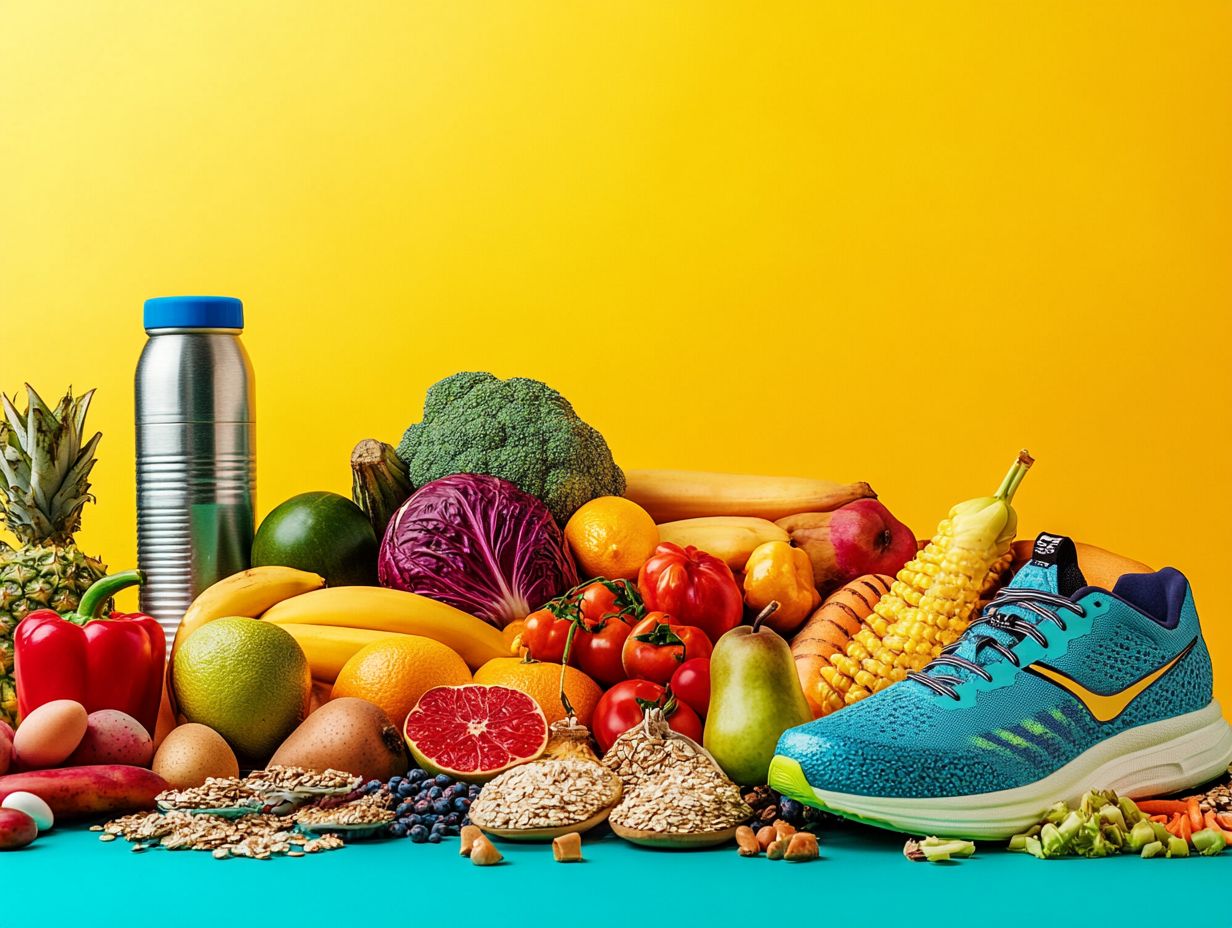
What are five important things to know about Dietary Guidelines for Athletes?
The five key points include nutrient needs, hydration, pre- and post-workout nutrition, supplementation, and personalized plans.
What are the nutrient needs for athletes?
Athletes need more nutrients than the average person due to their high energy demands. They require sufficient carbohydrates, proteins, and healthy fats for energy and recovery.
How important is hydration for athletes?
Hydration is vital for peak performance. It regulates body temperature, transports nutrients, and eliminates waste. Athletes should drink water throughout the day and during workouts to replace fluids lost in sweat.
What should athletes eat before and after a workout?
Before a workout, athletes should have a balanced meal or snack with carbohydrates, protein, and healthy fats for energy.
After a workout, it s crucial to replenish glycogen stores with a meal or snack containing carbohydrates and protein.
Are supplements necessary for athletes?
A well-rounded diet usually provides all the nutrients an athlete needs. However, some may benefit from specific supplements. Always consult a healthcare professional before starting any supplement regimen.
Should athletes follow a specific diet plan?
Dietary needs can vary greatly among athletes based on their sport, training intensity, and personal preferences.
Collaborating with a registered dietitian is the best way to create a nutrition plan tailored to individual goals.

